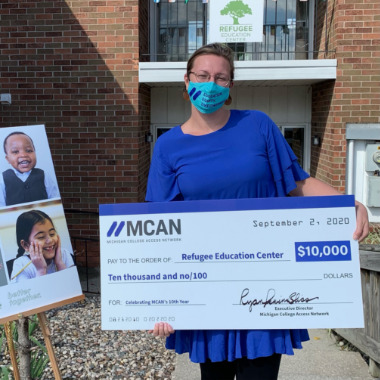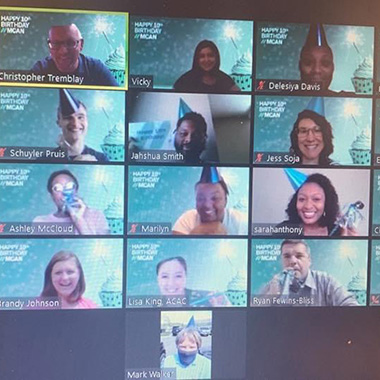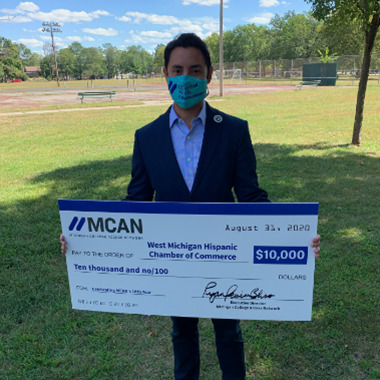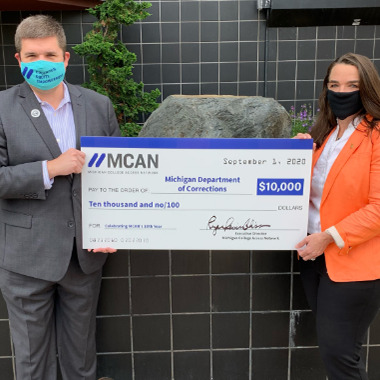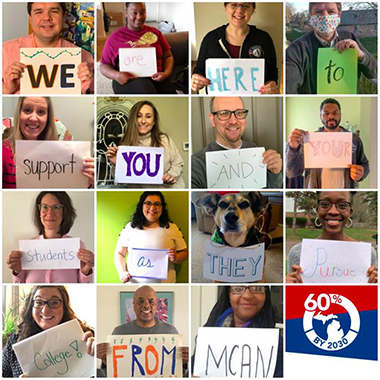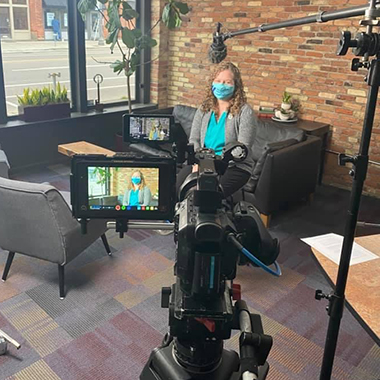2020 A voice for all students.
Stepping up as a leader during a crisis.
2020, of course, was a challenging year for everyone. Every individual, business, and sector was impacted by the COVID-19 pandemic in one way or another — and the college access space was no exception. Entering our 10th year as an organization, we saw challenges when it came to declining enrollment rates and a broadening socioeconomic and racial divide. Still, while the rest of the world slowed down, we knew it was our responsibility to carry on stronger than ever to be a voice for students — particularly low-income students, first-generation college-going students, and students of color — who needed our support more than ever. Considering these populations traditionally face many barriers to higher education to begin with, we saw great need for our advocacy and support. And so, we stepped up.
Releasing webinars
Immediately, we knew we needed to meet people where they were: online. We developed a new webinar series, Meeting the Challenge, designed to help college access professionals navigate ever-changing issues in their field as it continues to be affected by COVID-19. These 60-minute virtual sessions featured experts who provide valuable insight and information. More than 3,000 attendees took part in the webinars from April through June.
"I wish I would've known about MCAN sooner. I was impressed by their team approach to issues. MCAN isn’t afraid to get its hands dirty. They don’t just put out whitepapers — they actually work to fill the gaps they talk about."
Offering support grants
In May, we announced our COVID-19 Response Grants. These grants aimed to confront the challenges presented by the COVID-19 pandemic for Michigan high schools, Local College Access Networks, community-based nonprofit organizations and higher education institutions. Funding was awarded to grantees that presented solutions for pandemic-related issues directly relating to postsecondary access and success. Grants supported projects such as helping college access-oriented organizations purchase wireless internet hotspots; providing computers or tablets to distribute to students to aid with the college application process; and helping organizations convert traditionally in-person resources, such as mentoring programs and SAT preparation classes, to online formats. Over the course of the year, MCAN awarded 108 COVID-19 Response Grants to 105 different organizations, totaling $625,000 to help Michigan students keep up, regardless of the circumstances.
Keeping students and colleges connected
As many colleges and universities adjusted their application requirements with test-optional practices and cancelled their in-person student interactions due to COVID-19, a need emerged to facilitate communication between students and higher education institutions. As Michigan’s only statewide organization focused solely on college access and success, we formed the Rapid Response Enrollment Task Force with higher education associations and worked on behalf of Michigan’s colleges to help find innovative solutions and stave off the COVID-19 college enrollment crisis. We also compiled the College COVID Response Guide, a tool for counselors, college advisers, and other direct service providers to share the most up-to-date college admissions information with their students.
Adapting and creating programs
While most of our annual events were canceled in 2020, including our MCAN Conference, Advocacy Day, and Maritime Academy, we were able to identify creative solutions to support high schools in hosting virtual and community Decision Day celebrations, including institutions across the state hosting virtual events for enrolling students. The celebrations took place in digital spaces using video conferencing and social media, and in communities through car parades, banners, and signage.
We also organized the School Counselor Fellows Program this year, in partnership with San Diego State University’s Center for Equity and Postsecondary Attainment. This is a two-year program, where fellows investigate how the pandemic, mental health and wellness, and equity-driven practices influence college and career readiness.
Nine schools were awarded nearly $180,000 in Reach Higher System Impact Grants. Grants of up to $20,000 are available to schools that have demonstrated innovative, reform-minded programs to encourage progress toward postsecondary attainment.
College Completion Corps was also a top accomplishment of 2020. The program trains and places 23 AmeriCorps members on partner college campuses across Michigan. These completion coaches serve a campus-defined cohort of 100-150 students who are first-generation, low-income, or students of color, with a focus on college persistence and completion. As of the first year of the program, plans to expand to additional campuses are already underway, with projections to reach even more students in the coming years.
Expanding support
Additionally, we created the College Advising Hotline, a phone number that students could call or text for answers to questions about attending college. The hotline was staffed by nearly 100 college advisers connected to AdviseMI and MSU’s College Advising Corps, and aimed to provide additional advising services to districts where school counselors don’t exist and to streamline direct communication to students.
“How we’ve responded to the COVID-19 crisis has been incredibly impressive,” says Executive Director Ryan Fewins-Bliss. “I'm constantly bragging about how the team has pulled this off. We thought things were going to be quiet and simple, but it ended up being very complex. I’ve never worked as hard, and that’s the same for the rest of the crew at MCAN.
“We were able to engage thousands of people in webinars, generate funds, and have been able to serve a growing need in the community. A lot of organizations have hunkered down during this time, and we've done the opposite. Rather than weathering the storm, we asked: What do we need to do to solve this, for the long-term?”
"MCAN’s legacy is going to be there for generations."
Sourcing funds
We also received two major grants in 2020. In January, the Community Foundation of Southeast Michigan (CFSEM) awarded MCAN with a $30,000 grant to partner with One Michigan for the Global Majority to support undocumented students in their pursuit of postsecondary education. In June, Ballmer Group awarded MCAN with one of our first philanthropic million-dollar grants: $1.35 million to fund our strategic initiatives. This marked MCAN’s first grant from Ballmer Group, and provided the remaining funds required by MCAN’s match challenge from The Kresge Foundation in 2019.
Updating our brand
This year, we also improved our public-facing image and identity with new organizational branding. This new brand was more than modern visuals and an updated website — it exemplified how we are entering the next level as an organization and are here to stay, as we continue to expand our reach and reputation as Michigan’s leader in college access.
Over the past 10 years, MCAN has built a solid foundation, a dedicated group of leaders, and a strong network of supporters. It is this foundation that allowed us to step up as a leader during the COVID-19 pandemic. Our past accomplishments helped us power through the challenges before us, going on to support Michigan students who needed us. 2020 reaffirmed that we must keep pushing through programs, advocacy, and initiatives to save education for all students.
Financials
2020 Revenue & Support
Revenue & support
2020 Expenses
Program services
Supporting services
Michigan College Access Network was formed on August 23, 2010 and became its own legal entity on November 1, 2011 when it merged with another 501(c)3 organization. We are supported by a mixture of governmental grants, philanthropic grants, and program income. Our expenses are focused on providing support, services, and programs that further postsecondary access and attainment.
Current financial statements are published below.
MCAN is committed to transparency and accountability. Detailed financial statements are presented to the MCAN board of directors for review and oversight on a quarterly basis. MCAN’s certified public accountant supports MCAN's financial management and bookkeeping duties. In addition, MCAN contracted with Doeren Mayhew for auditing services.
Top Accomplishments
- Adapted to the COVID-19 pandemic by providing COVID-19 resources, hosting a Meeting the Challenge webinar series, and presenting virtual College Access Impact Awards
- Awarded 108 COVID-19 Response Grants to assist postsecondary attainment efforts
- Launched the College Completion Corps and the School Counselor Fellows program
- Partnered with Gov. Whitmer to promote the Governor’s FAFSA Challenge and College Cash Campaign
- Held our 10/10/10 Birthday Tour, awarding ten $10,000 grants to ten organizations in support of college access and postsecondary attainment over a ten-day period.
- Established our Roadmap to Opportunity website and video series
- Saw Executive Director Ryan Fewins-Bliss testify at the House Appropriations Subcommittee on Higher Education and Community Colleges meeting
- Created the College Advising Hotline
- Released our first-ever digital annual report report, providing an interactive viewing experience
- Moved to a new office within 200 N. Washington Square in Lansing, to accommodate our growing staff
- Introduced new organizational branding
